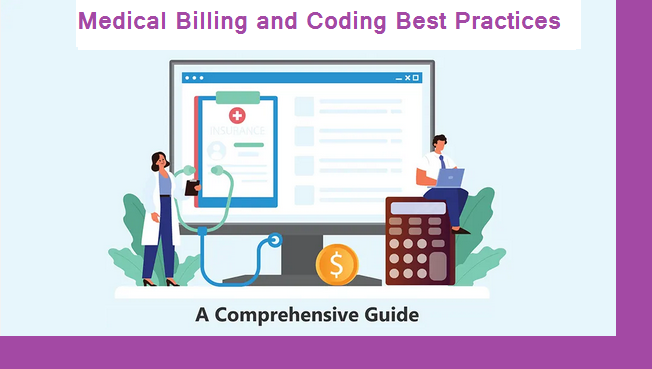Medical Billing and Coding Best Practices
Medical billing and coding play a crucial role in the healthcare system, ensuring that healthcare providers receive accurate reimbursement for their services. In this comprehensive guide, we will delve into the intricacies of medical billing and coding, shedding light on the best practices that professionals in this field should adopt. From understanding the fundamentals to staying updated with evolving regulations, this guide will serve as a valuable resource for both beginners and experienced practitioners in the healthcare revenue cycle management landscape. Medical Billing and Coding Best Practices.
Fundamentals of Medical Billing and Coding:
At the core of medical billing and coding lies the translation of medical services into universally recognized codes. The use of standardized code sets, such as CPT, ICD-10, and HCPCS, is fundamental to accurately document and bill for healthcare services. Professionals in this field must be well-versed in code assignment, ensuring that each procedure and diagnosis is accurately represented. Regular training and updates on coding conventions and guidelines are essential to maintaining accuracy and compliance.
Navigating the Regulatory Landscape:
The healthcare industry is dynamic, with regulations and policies constantly evolving. Professionals in medical billing and coding must stay abreast of changes, such as updates to the Current Procedural Terminology (CPT) codes or modifications to the International Classification of Diseases (ICD) coding system. Compliance with the Health Insurance Portability and Accountability Act (HIPAA) is non-negotiable, emphasizing the importance of safeguarding patient information throughout the billing process.
Effective Communication between Billing and Clinical Staff:
Smooth communication between billing and clinical staff is paramount for accurate coding and billing. Coders should maintain open lines of communication with healthcare providers to clarify any ambiguous documentation, ensuring accurate code assignment. Regular meetings and training sessions that involve both billing and clinical staff can foster a collaborative environment, reducing errors and improving the overall efficiency of the medical billing and coding process.
Embracing Technology for Efficiency:
In the modern era, technology plays a pivotal role in streamlining medical billing and coding processes. Electronic Health Records (EHRs) have become integral, providing a centralized platform for storing patient information and facilitating seamless communication between healthcare providers and billing professionals. Automated coding software and artificial intelligence tools can assist in code assignment, reducing the likelihood of errors and improving overall efficiency.
Quality Assurance and Auditing:
Implementing a robust quality assurance and auditing process is essential to identify and rectify errors in medical billing and coding. Regular internal audits can help pinpoint areas of improvement, ensuring compliance with industry standards and regulations. External audits, whether conducted by third-party organizations or payers, serve as valuable checkpoints to validate the accuracy and integrity of the billing and coding practices in place.
Continuous Professional Development:
The landscape of medical billing and coding is ever-evolving, requiring professionals to engage in continuous learning. Staying updated with industry trends, attending workshops, and participating in relevant certifications contribute to the ongoing development of skills and knowledge. Professional organizations, such as the American Academy of Professional Coders (AAPC) or the American Health Information Management Association (AHIMA), provide resources and opportunities for networking and education.
Ensuring Accuracy through Coding Fundamentals:
At the heart of medical billing and coding is the accurate translation of medical services into standardized codes. Coding professionals must be adept at assigning appropriate codes for procedures and diagnoses to ensure precise documentation. The utilization of code sets such as CPT, ICD-10, and HCPCS demands a nuanced understanding of coding conventions and guidelines. Regular training sessions are imperative for coding professionals to stay updated on the latest code changes, ensuring the accuracy of their work.
Staying Informed about Regulatory Changes:
The healthcare landscape is in a constant state of flux, with regulations and policies evolving to meet the industry’s demands. Professionals in medical billing and coding must remain vigilant and informed about changes, be it updates to CPT codes, modifications to the ICD coding system, or amendments to compliance standards like HIPAA. Adherence to these regulations not only ensures ethical practice but also safeguards patient information, emphasizing the importance of compliance throughout the billing process.
Fostering Collaboration between Billing and Clinical Teams:
Effective communication between billing and clinical staff is critical for accurate coding and billing. Coders need to establish open lines of communication with healthcare providers to clarify any ambiguous documentation, thus guaranteeing precise code assignment. Regular collaborative meetings and training sessions involving both billing and clinical staff create an environment where information flows seamlessly, reducing errors and enhancing the overall efficiency of the medical billing and coding process.
Leveraging Technology for Streamlined Processes:
Modern technology has become an indispensable tool for optimizing medical billing and coding workflows. Electronic Health Records (EHRs) serve as centralized hubs for storing patient information, facilitating smooth communication between healthcare providers and billing professionals. Automated coding software and artificial intelligence tools contribute to efficient code assignment, minimizing the risk of errors and enhancing overall process efficiency.
Implementing Robust Quality Assurance Measures:
Quality assurance and auditing processes are vital to identify and rectify errors in medical billing and coding. Regular internal audits provide insights into areas that require improvement, ensuring ongoing compliance with industry standards and regulations. External audits, whether conducted by third-party organizations or payers, serve as valuable checkpoints to validate the accuracy and integrity of the billing and coding practices in place.
Prioritizing Continuous Professional Development:
As the healthcare industry evolves, professionals in medical billing and coding must engage in continuous learning to stay ahead. Keeping abreast of industry trends, attending workshops, and obtaining relevant certifications contribute to the ongoing development of skills and knowledge. Professional organizations like the American Academy of Professional Coders (AAPC) and the American Health Information Management Association (AHIMA) offer resources and opportunities for networking and education, supporting the growth of professionals in this dynamic field.
In navigating the intricacies of medical billing and coding, the adoption of these best practices ensures a solid foundation for accuracy, compliance, and efficiency. The synergy between coding fundamentals, regulatory awareness, collaboration, technological integration, quality assurance, and ongoing professional development is key to achieving excellence in this essential component of the healthcare system.
Conclusion:
In conclusion, mastering medical billing and coding best practices requires a multifaceted approach that includes a solid understanding of coding fundamentals, adherence to regulatory requirements, effective communication, technological integration, quality assurance, and a commitment to continuous professional development. By embracing these best practices, professionals in the field can contribute to a more efficient and accurate healthcare revenue cycle, ultimately benefiting both healthcare providers and patients.
Recent Posts
- The 13 Best Cloud Hosting Providers for WordPress: A Comprehensive Guide
- The Transformative Power of Online Master of Social Work (MSW) Programs
- Top 13 Mortgage Refinance Companies of 2024
- SATNAM SHRI WAHEGURU SAHIB JI
- Personal Experiences and Testimonials About the Power of Sunderkand
Author Profile

Latest entries
- 28 June 2025BlogHow to Choose the Best High-Yield Savings Account with 5%+ Interest in India (2025 Guide)
- 28 December 2024Blog13 High CPC Blog Niche for 2025
- 28 December 2024BlogTop 6 Employee Management Software for Small Businesses
- 19 December 2024BlogShri Hanuman Chalisa in Hindi Text with English Translation

